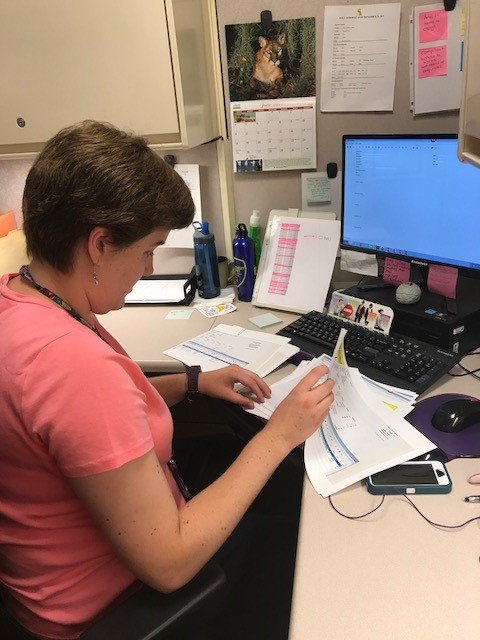Social Security makes every effort to ensure that any information published is accurate and up to date, but some information on this webpage may be historical.
Amy's Success Story: Harnessing a Tornado
Published in 2017
 The wall of words in Amy's American history textbook was wider on top than it was near the bottom of the page. Crowded text blended together into a pattern that looked like a tornado. As instructed, she had been reading quietly in her classroom for more than 10 minutes. But the meaning of what she had read escaped her.
The wall of words in Amy's American history textbook was wider on top than it was near the bottom of the page. Crowded text blended together into a pattern that looked like a tornado. As instructed, she had been reading quietly in her classroom for more than 10 minutes. But the meaning of what she had read escaped her.
As the clock ran down and other students were finishing the passage, Amy started over. She struggled with distracting thoughts, emotions and ideas. Her teachers and classmates could only see a fraction of the storm that raged inside of her. They couldn't possibly understand how much effort went into remaining focused and moving through multi-step tasks – things that happen automatically for most people.
Amy's brain differs chemically and physically from others. She has a developmental disability that affects language, learning and social interactions. Her symptoms include sensory information overload, difficulty with social cues, and distraction when performing tasks. For some people with developmental disabilities, the extra time and effort required to achieve certain milestones can wear down self-esteem.
But growing up, Amy discovered that the neurological differences she was born with are accompanied by valuable strengths as well as life-long challenges. Her experiences in and out of school created opportunities for self-discovery, and her struggles began to shape her character. She learned how to manage some of her symptoms, while appreciating the rewards of having a spirited personality. Supportive family members and professionals helped Amy harness her creativity, work ethic and social energy to find satisfaction as an adult in the "real world."
After finishing high school, Amy enrolled in a few college courses and started working as a bagger at Giant Food. She was eligible for Supplemental Security Income (SSI), a type of Social Security disability benefit, which she began receiving in 2012.
But Amy felt under-employed and wanted to find a way to financial independence through work. She looked for help from the Maryland Vocational Rehabilitation (VR) agency. State VR agencies offer services and programs that help people with disabilities enter the workforce. Amy's VR counselor helped her learn about her options, including Social Security's Ticket to Work (Ticket) Program.
Ticket to Work and Work Incentives
The Ticket Program supports career development for people with disabilities who want to work. Adults ages 18 through 64 who receive Social Security disability benefits qualify. Through Ticket to Work, service providers, like the VR agency in Amy's state, offer a range of free employment support services. Ticket Program participants may also choose to work with Employment Networks (EN), providers that sometimes specialize in certain services or may serve specific populations. The goal is to help participants find their path to financial independence by supporting their career goals throughout the journey to employment.
Amy, like many people who want to work, knew she would need support as she prepared for a more independent life. That included guidance on how employment would affect her Social Security disability benefits. Through an agreement called Partnership Plus, Amy's State VR counselor began by connecting her with Full Circle Employment Solutions (Full Circle), a Maryland-based EN with qualified Benefits Counselors who explain how working can affect Social Security disability benefits.
Amy's Benefits Counselor at Full Circle told her about Social Security rules called Work Incentives. Work Incentives make it easier for adults with disabilities to enhance their job skills and gain work experience, while receiving Medicaid or Medicare and benefits from Social Security. Amy and her family were relieved to learn that her Medicaid coverage could continue, even if her earnings became too high for an SSI benefit payment. This Work Incentive, Medicaid While Working (or Section 1619b), allowed Amy to focus on pursuing employment without worrying about losing her healthcare coverage. She also found out that if she needed to stop working, she could qualify for Expedited Reinstatement, a Work Incentive that might allow her to receive benefits again without filing a new application.
With a better understanding of the Ticket Program and Work Incentives, Amy was ready to continue exploring her employment options. The next step was to find training that could help her translate strengths into work skills.
Learn More About Work Incentives
There are many different Work Incentives that help people go to work. To learn more, register for a Work Incentives Seminar Event (WISE) or call 1-866-968-7842 or 1-866-833-2967 (TTY). You can also learn about Work Incentives by reading Social Security's Red Book. Job seekers are encouraged to consult a Benefits Counselor, as each person's circumstances are different.
Project SEARCH
One of Amy's friends had found an internship through Project SEARCH, a school-to-work training program for young adults with developmental disabilities. Full Circle collaborates with Project SEARCH, and having heard of her friend's success, Amy decided to give it a try.
Project SEARCH helps students learn and practice job skills in a year-long internship, preparing them for competitive employment. Participants receive a combination of classroom instruction, career exploration and hands-on training at a worksite. At the end of the year, some Project SEARCH interns are offered jobs at their internship site.
Through Project SEARCH, Amy worked as an intern doing office tasks at Montgomery County's Department of Finance. She applied her attention to detail and found mistakes that saved the county money. Her supervisors were impressed. Amy's energy and work ethic earned her a position as Principal Administrative Aid for Montgomery County's Department of Finance. She wears many hats in her role as assistant to the property tax collection manager, and says the work environment is a good fit.
"I sort, log and distribute the mail," Amy says, "… and help with many other administrative tasks. When it's busy during tax season, there is no time to get side-tracked. I like that because I don't do well with down time. Being part of a team is satisfying… I'm making contributions and have [a sense of] accomplishment. Now I'm a taxpayer too, and that feels great!"
Clearer Skies and Continued Support
 It's been 4 years since Amy started work as an employee in Montgomery County's Department of Finance. Her role as a member of the Treasury division's team has evolved along with her connections to other employees.
It's been 4 years since Amy started work as an employee in Montgomery County's Department of Finance. Her role as a member of the Treasury division's team has evolved along with her connections to other employees.
"The county has a wellness program for employees and I love it! We challenge one another to stay healthy… do walking groups, yoga and Zumba. Being part of a team that works together and then works out together is great," Amy reflects. "It's a good way to stay connected to other people ..."
Thanks to an agreement between Amy's EN and her VR agency, Amy continues to receive support services from Full Circle, even though VR closed her case after she received a job offer. This collaboration between State VR agencies and ENs, known as Partnership Plus, gives Ticket Program participants continued access to individualized employment supports, should they need them. Amy's job coach says that Partnership Plus has helped many clients who otherwise might not have access to continued employment support after receiving an offer letter. Partnership plus, though, sets clients up for long-term job success by allowing them to keep job-coaching services.
While Amy is a Ticket Program participant, Full Circle (and their Provider Partner, SEEC) work together so that Amy is set up for success at work. SEEC works with Amy on "soft skills," with job coaching that helps her reduce anxiety, prioritize tasks, manage impulses, exercise flexibility, and learn appropriate workplace protocols. "I've learned how to adjust when things change," she reflects, noting that the support she receives from her job coach at SEEC is helping her grow personally and professionally. Meanwhile, staff at Full Circle check in regularly to help Amy stay organized, correspond with Social Security and address any job-related issues that arise. Amy can focus on navigating the workplace, building upon her professional experiences, and strengthening her connections with coworkers.
Amy earned her way to financial independence and no longer receives SSI benefits. Now, she's part of a union, receives benefits through her job, and enjoys the security and stability that come with full-time employment. She's grateful for the support she received through the Ticket Program, and looks forward to building the future she always hoped for.
"This job makes me feel needed and welcomed," she says. "I have learned about what motivates me and how to keep going, even when things get hard."
Ticket to Work and Work Incentives helped Amy find her path to a better future. Find yours! To learn more, visit www.ssa.gov/work and contact the Ticket to Work Help Line at 1-866-968-7842 or 1-866-833-2967 (TTY). Ask a representative to send you a list of service providers, or find providers on your own with the Ticket to Work Find Help tool
Sources: In addition to subject interviews, the following sources were used in developing this feature:18 People Explain what ADHD Feels Like TheMighty.com;Project SEARCH program model